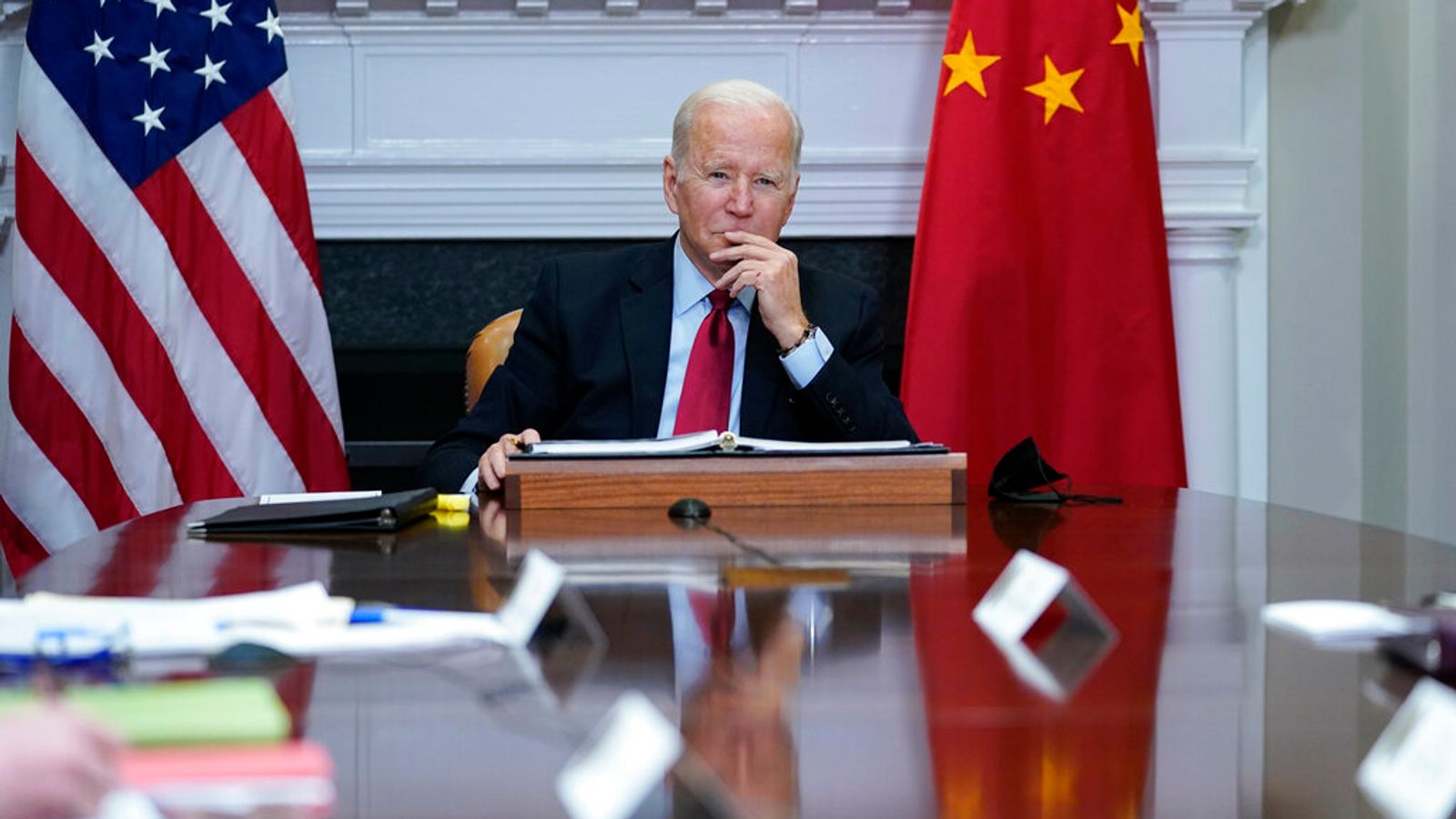A virtual meeting between US President Joe Biden and China’s Xi Jinping has taken place – with the Chinese leader greeting his US counterpart as his “old friend”.
The supposed friendly correspondence comes amid rising tensions between the two superpower nations.
Sky correspondents Tom Cheshire and Joe Pike offer some expert insight below into the meeting between the two leaders – and what the possible outcome of their discussions could mean.
Analysis by Tom Cheshire, Asia correspondent
We don’t have much substance to go on – the three hours that presidents Biden and Xi spent talking in depth won’t be made public – so it makes sense to talk about the tone.
And despite the differences between the US and China, it was chummy.
This was, effectively, a Zoom meeting and both leaders gave each other a cheery wave when they saw each other. It felt surreal given the US has accused China of committing genocide.
Biden and Xi Jinping virtual meeting: US president says the goal is to ensure competition ‘does not veer into conflict’
COP26: Why an appetite for emissions data shows China is taking climate change seriously
China’s Communist Party cements Xi Jinping’s authority with ‘historical resolution’
Joe Biden thanked Xi Jinping for congratulating him on his election and reminisced about the time they had previously spent together. Mr Xi called Mr Biden “my old friend”.
It might seem frivolous to focus on the social niceties but Mr Biden has made clear that his brand of diplomacy starts from personal relationships.
And this is the most important geopolitical relationship in the world: if both leaders understand each other, there is less room for the sort of mistakes that could lead to conflict. Mr Biden emphasised this, saying that the two had “never walked away wondering what the other man was thinking”.
That is crucial when it comes to Taiwan, which China said was a “red line” ahead of meeting. Official US policy is described as “strategic ambiguity”.
That doesn’t mean that the US can’t be more explicit in private conversations though – and what Mr Biden said to Mr Xi will be crucial.
As for China, it’s clear that it wants to calm down the fractious relationship between the US.
But it won’t budge on other aspects, such as the repression of Hong Kong and Xinjiang.
This meeting gives China a bit of breathing space. It will be fair to ask what the US is getting in return.
Analysis by Joe Pike, political correspondent, in Washington DC
The choreography was warm and folksy, with Mr Biden and Mr Xi briefly reminiscing about their travels together as vice presidents.
This masked the frostiness, tension and mistrust that is the reality of relations between the two nations – in particular over Taiwan, the topic likely to have dominated discussions.
Secretary of State Anthony Blinken’s warning last week that the US and allies would “take action” to defend the self-governing island is unlikely to have been a helpful prelude to this bilateral meeting.
The White House will be pleased that the two men have actually met, after only speaking twice by phone since Mr Biden took office. It does not help that Mr Xi has not left his country in nearly two years, partly due to the pandemic.
The presidents find themselves facing very different political futures. Mr Xi is tightening his grip with a third five-year-term in office. Meanwhile, Mr Biden is losing ground: in the polls, and perhaps next year in Congress.
Follow the Daily podcast on Apple Podcasts, Google Podcasts, Spotify, Spreaker
US-China cooperation has led to progress on tackling global warning, with last week’s surprise bilateral climate agreement. But competition is also fundamental to the relationship, in particular over technology and industrial policy.
It is far too early to declare a thaw in relations. After the last few strained years, expectations in Washington were low. But talking face-to-face, albeit virtually, is progress.
Relations with Beijing are likely to remain Mr Biden’s most pressing foreign policy priority.






















